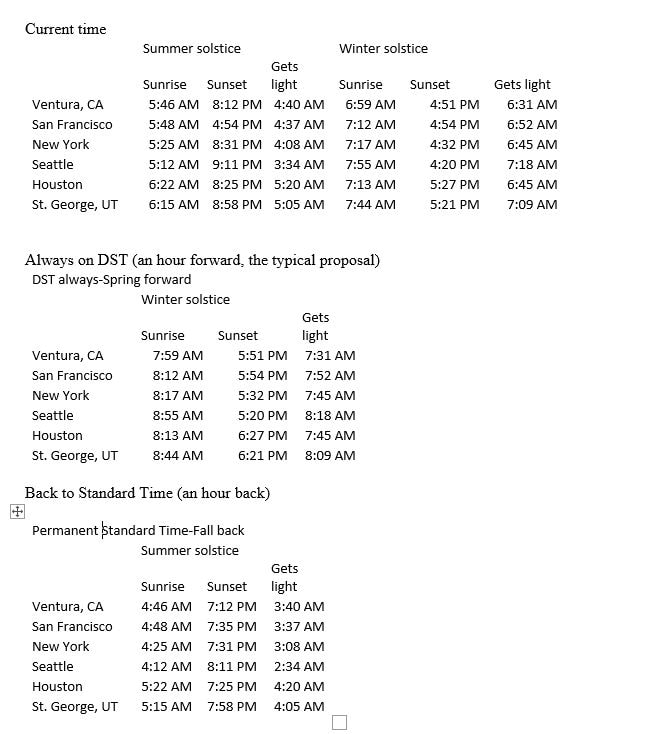 Getting rid of the time change is a stupid idea that virtually everyone would complain about in the first year. California’s recent ballot proposition to go to DST year-round would send kids to school in the dark. Twice-yearly kvetching over adjusting the clocks (really just in Spring because people have to wake up early for a week or two) is nothing compared to what we would hear. If we went to DST year round, most people would experience a summer solstice sunrise around 4-5 AM, with the sky getting light around 3-4 AM. This is great if you are an early riser like me but most people would complain that it gets light too early. In winter, you get sunset an hour later, which would be 5-6 PM instead of 4-5 PM. Is that really worth all the light in the morning? And except for people in Seattle who hate having to send the kids to bed when the sun is still up, how many people will flip out because the long summer evenings aren’t quite so long? Now let’s look at what life would be like on Standard Time all the time. Standard Time was what we were on before DST was invented, but time was kept more locally and people’s time was more flexible than it was today. Sunrise wouldn’t be until 8 AM most places, getting light only a short-time before. You would be commuting and your kids would be going to school in the dark. Dark mornings are a lot more depressing and dangerous than dark evenings. The point of this rant is that democracy is a terrible idea because people vote emotionally on superficial issues like “changing the clocks is stupid” and that it annoys them to wake up an hour earlier for two weeks in March without considering the other consequences. About my times My "gets light" time varies from summer using nautical twilight to winter using civil twilight. Humans like to use extremes when complaining about some thing, so I used the illumination status to illustrate approximately when I think people would naturally complain. There are three twilight periods: astronomical, when the starts start to disappear; nautical, when the sky is noticeably light; and civil, traditionally the start and end of when you can work outside. Historically humans woke between nautical and civil twilight and began their days. Civil twilight is naturally light enough that artificial lights (headlights) are not needed. Nautical twilight makes it difficult to distinguish objects on the ground and artificial illumination is generally needed. Summer solstice "get light" time is taken from nautical twilight because people will see the sky begin to lighten, which will wake people up, and they'll use the earlier time to complain. The actual sky light enough to be considered dawn occurs roughly between nautical and civil twilight. In winter, I used civil twilight because people would probably bitch that it doesn't get light until about that time, which is when they'd probably feel comfortable going outside, taking the kids to school, etc. Part 1
The movement to abolish the time change is stupid. Going to Daylight Savings Time instead of Standard Time is even dumber. Idiots don't like the week long adjustment period of waking up earlier and obsesses about more light in the evening, even though they will probably be inside watching Netflix or not enjoying it anyway. What people don't understand is that time zones vary. I visit a friend in St. George, Utah, on the western edge of the Mountain Time Zone, and it seems to stay light very late. 9 PM in the summer sneaks up on you. St. George should probably be on Pacific time or a half hour ahead. Go north, and things change, but we understand that. Seattle has very long days in the summer and it stays light forever in summer. Not having a time change works when you are closer to the equator. Arizona is pretty far south, all things considered. Hawaii is much closer to the equator. In fact, on the equator, days are consistently about 12 hours long. It gets light around six and gets dark around six, pretty much the year round. Not so much in the equatorial latitudes. The latest sunrise of the year, around January 1st, would be at 8:25 AM in San Francisco, to name one extreme. In Ventura, this is 8 AM. Twilight wouldn't even begin here until 7:30 AM. How depressing do you think it will be having to wake up in the dark and drive to work in the dark and start working when the sun is just coming up? One year of that and people will be demanding that we go back to changing the clock. Just watch and see. Adjusting schedules will be unrealistic. Besides, it would be the same as the time change without moving the clock. If you start work later, at say 9:00 AM in winter, you'll bitch come spring when you have to wake up early and come in at 8:00. Seasonal hours are out. It would be too complicated and confusing. We live in a world of "on time." Accurate clocks are everywhere and people expect businesses and stuff to be open at a given time. Showing up late or varying hours is not going to happen except for a very small number of highly paid salaried people; i.e. not the people who are complaining because they have to turn up at work at 8 AM. Senator Rubio said that teenagers should start school later in the day. True, but moving school back an hour is easier than asking millions of businesses to do it. The corporate world will resist moving start times back because it's too dark in the morning. You commute home in the dark, many people commute in while it's still dark, so you will commute in at the same time in the dark. They won't care. So stop complaining and deal with it. Try working a 12-hour Panama shift dark-to-dark for so long that you can't remember what time of the year it is and then you can complain. |
AuthorNote: this an adaptation from my non-fiction book Suburban Warfare: A cop's guide to surviving a civil war, SHTF, or modern urban combat, available on Amazon. Archives
December 2023
|
The information herein does not constitute legal advice and should never be used without first consulting with an attorney or other professional experts. No endorsement of any official or agency is implied. If you think this is in any way official VCSO business; you're nuts. The author is providing this content on an “as is” basis and makes no representations or warranties of any kind with respect to this content. The author disclaims all such representations and warranties. In addition, the author assumes no responsibility for errors, inaccuracies, omissions, or any other inconsistencies herein. The content is of an editorial nature and for informational purposes only. Your use of the information is at your own risk. The author hereby disclaims any liability to any party for any loss, damage, or disruption through use of the information. Copyright 2023. As an Amazon Associate I earn from qualifying purchases. Donut icons created by Freepik - Flaticon
